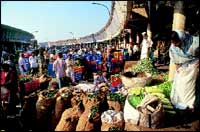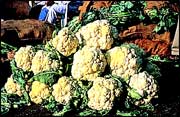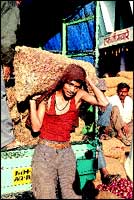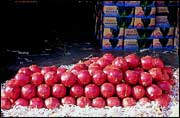


|
|
|
When most of the world around is in the deep recesses of post-midnight slumber, the place is teeming with frenetic activity. Trucks and tempos growl and grunt impatiently as they await their turn to disgorge their contents and get on with their day's repose. Elsewhere, a tractor lumbers in noisily, and farmhands perched precariously over a load of freshly picked greens manoeuvre nimbly in the diffused light of a few naked bulbs dangling from high gala ceilings, hoping to strike the best deals. And not so far from the high piles of fruit and vegetable, a pair of bullocks, de-yoked from the carts they pulled in, ruminate peacefully as their masters get on with the task of off-loading. The first light isn't yet anywhere in sight on the Eastern horizon, and the working `day' at the Shiv Chhatrapati Market yard, Pune's Gultekdi wholesale market for every kind of farm produce, is already some hours old. At the stroke of five, a sharp buzzing sound rents the air. It's the cue for an action-shift � from the business of large-scale buying to the more lucrative one: selling. Would-be customers peruse the surroundings, and look for the best deals. (It's amazing to see the number that had the same idea!). Obviously here the aphorism "the earlier, the better" holds complete sway � it's quite ruthlessly a case of "first come, first served best!"
Business hours for the non-perishable items � from salt, cereals condiments and spices to sugar, gur, pulses and oils � are distinctly more civilised! The total transaction on any average day? In the region of a couple of crore of rupees. Which translates into roughly Rs. 500 crore worth of business annually. Terms of payment? Cold, hard, currency.
The sprawling wholesale market, which, Dhanraj Gandhi, a stall holder boasts, is the "best managed in Asia", is located at Gultekdi, in the southern part of the city. Spread over 75 acres and circular in shape, eight manned gates in the high wall enclosing the territory stringently monitor the every entry and exit.
At the market yard, a small army of people keeps the place ticking. Three hundred wholesalers � dalals � who own the gaalas, and 400 odd inspectors � mapadis � who keep a close tab on the trading, weights and measures, confabulate every morning to decide the prevailing price. A clutch of sweepers keeps the place clean, and a patch of land in the vicinity is dedicating to converting the 20 odd tons of bio-waste generated daily into compost. And keeping close watch over the whole proceedings is the Agricultural Produce Marketing Board, an autonomous corporate body.
It was the vision and foresight of essentially one man and well-to-do farmer, Annasaheb Magar, whose efforts to rationalise the local agro production led to the setting up of the market yard in 1979. Today it has evolved into an entity whose rhythmic heart beat keeps the pulse of the city and its surroundings strong and healthy.
|

Home Page
About the mag
Subscribe
Advertise
Contact Us
 Gultekdi
Gultekdi  The typical day, so to say, at what is generally referred to simply as the `market yard' begins with the stock-taking of perishables at the 500 odd open gaalas, including 60-odd ones for flowers, begins at around seven every evening. This continues till five in the morning, and then the business of selling commences. And its curtains on this at 2 p.m. sharp. There aren't any shutters to down (all the gaalas are open) but not a blade of grass is sold thereafter. Leftovers, if any, must be accounted for and stowed away, to await their turn at the following day's sale at 5 a.m. the next morning.
The typical day, so to say, at what is generally referred to simply as the `market yard' begins with the stock-taking of perishables at the 500 odd open gaalas, including 60-odd ones for flowers, begins at around seven every evening. This continues till five in the morning, and then the business of selling commences. And its curtains on this at 2 p.m. sharp. There aren't any shutters to down (all the gaalas are open) but not a blade of grass is sold thereafter. Leftovers, if any, must be accounted for and stowed away, to await their turn at the following day's sale at 5 a.m. the next morning.  Most of the produce, Krushi Uttpan of the Bazaar Samiti at Gultekdi says, comes in from the surrounding areas of Pune. Nagpur is a big feeding centre for fruits and vegetables. And villages in and around Pune city, provide fresh greens every morning. The trucks come in between 9 and 10 p.m. every night and by the time they have unloaded their produce and it is stocked up for sale in the many galas, it is 4.30 a.m. That�s about the hour the market is ready to start functioning, really. Approximately 400 trucks deliver the goods. Gultekdi is also frequented by small-time vendors, caterers, hoteliers, some army contractors, who buy small quantities of vegetables and fruits at rates that are cheaper than the retail markets. Likewise, there are middlemen who pick up the onions and potatoes for sale elsewhere from Gultekdi.
Most of the produce, Krushi Uttpan of the Bazaar Samiti at Gultekdi says, comes in from the surrounding areas of Pune. Nagpur is a big feeding centre for fruits and vegetables. And villages in and around Pune city, provide fresh greens every morning. The trucks come in between 9 and 10 p.m. every night and by the time they have unloaded their produce and it is stocked up for sale in the many galas, it is 4.30 a.m. That�s about the hour the market is ready to start functioning, really. Approximately 400 trucks deliver the goods. Gultekdi is also frequented by small-time vendors, caterers, hoteliers, some army contractors, who buy small quantities of vegetables and fruits at rates that are cheaper than the retail markets. Likewise, there are middlemen who pick up the onions and potatoes for sale elsewhere from Gultekdi. It is Pune's strategic location � in close proximity to extensive irrigated farmlands rendered productive the year round by the nine dams in the vicinity � that enhances the importance of this wholesale market. Asserts Gandhi, "Though the wholesale market at Mumbai does four-fold business, the produce at Pune has an unparalleled freshness." No wonder, lorries pick up produce on a large scale to transport it to neighbouring states and cities.
It is Pune's strategic location � in close proximity to extensive irrigated farmlands rendered productive the year round by the nine dams in the vicinity � that enhances the importance of this wholesale market. Asserts Gandhi, "Though the wholesale market at Mumbai does four-fold business, the produce at Pune has an unparalleled freshness." No wonder, lorries pick up produce on a large scale to transport it to neighbouring states and cities.